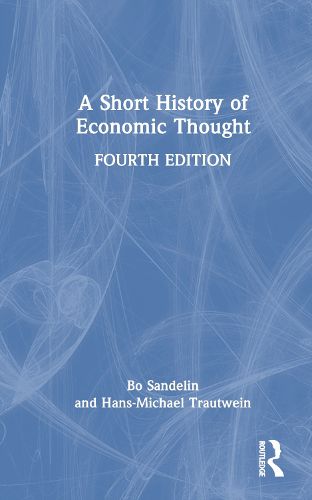Readings Newsletter
Become a Readings Member to make your shopping experience even easier.
Sign in or sign up for free!
You’re not far away from qualifying for FREE standard shipping within Australia
You’ve qualified for FREE standard shipping within Australia
The cart is loading…






Now in its fourth edition, A Short History of Economic Thought provides an elementary overview of the history of economic thought.
This new edition continues to offer its trademark of clear and concise coverage of the main schools of thought and paradigm shifts in the field of mainland Europe, as well as addressing Anglo-American trends. The book has been thoroughly updated throughout in order to reflect changes in the landscape of the field. Details on key thinkers, on early developments outside the Western world, and on the recent evolution of scholarship in quantitative and non-orthodox turns have been added or expanded, while not compromising on the book's concise approach. A chapter is devoted to each of the major developments in the history of the discipline, concluding with a chapter in which the authors draw together some of the key strands and comment on major works and textbooks in the history of economic ideas. They also reflect on the changes in economic thinking within the general context of the philosophy of science.
This text is ideal for courses where the history of economic thought constitutes only a small part or required background reading. It also continues to be an extremely useful, much-needed text for all introductory economics courses in the field.
$9.00 standard shipping within Australia
FREE standard shipping within Australia for orders over $100.00
Express & International shipping calculated at checkout
Now in its fourth edition, A Short History of Economic Thought provides an elementary overview of the history of economic thought.
This new edition continues to offer its trademark of clear and concise coverage of the main schools of thought and paradigm shifts in the field of mainland Europe, as well as addressing Anglo-American trends. The book has been thoroughly updated throughout in order to reflect changes in the landscape of the field. Details on key thinkers, on early developments outside the Western world, and on the recent evolution of scholarship in quantitative and non-orthodox turns have been added or expanded, while not compromising on the book's concise approach. A chapter is devoted to each of the major developments in the history of the discipline, concluding with a chapter in which the authors draw together some of the key strands and comment on major works and textbooks in the history of economic ideas. They also reflect on the changes in economic thinking within the general context of the philosophy of science.
This text is ideal for courses where the history of economic thought constitutes only a small part or required background reading. It also continues to be an extremely useful, much-needed text for all introductory economics courses in the field.